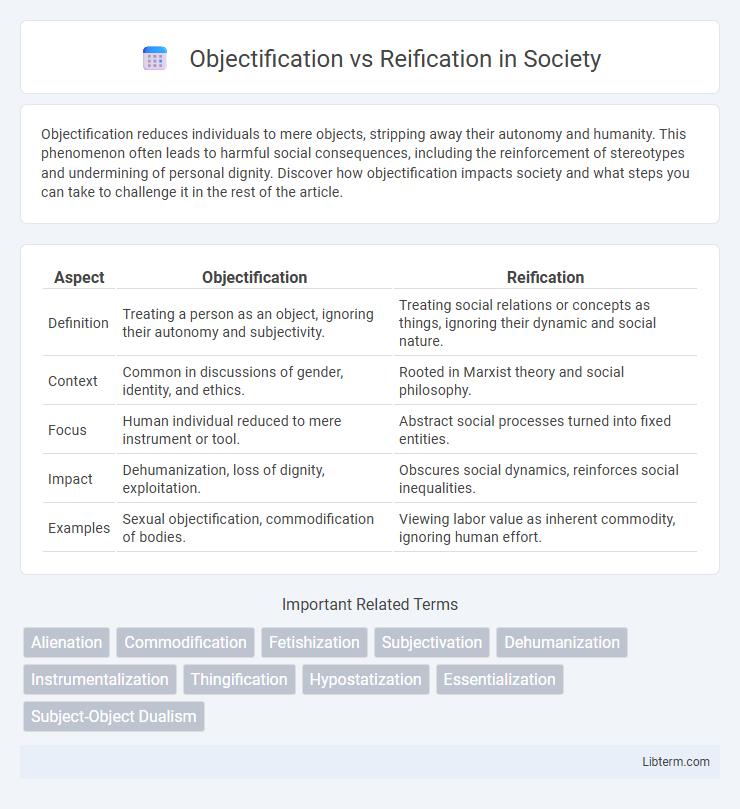Objectification reduces individuals to mere objects, stripping away their autonomy and humanity. This phenomenon often leads to harmful social consequences, including the reinforcement of stereotypes and undermining of personal dignity. Discover how objectification impacts society and what steps you can take to challenge it in the rest of the article.
Table of Comparison
| Aspect | Objectification | Reification |
|---|---|---|
| Definition | Treating a person as an object, ignoring their autonomy and subjectivity. | Treating social relations or concepts as things, ignoring their dynamic and social nature. |
| Context | Common in discussions of gender, identity, and ethics. | Rooted in Marxist theory and social philosophy. |
| Focus | Human individual reduced to mere instrument or tool. | Abstract social processes turned into fixed entities. |
| Impact | Dehumanization, loss of dignity, exploitation. | Obscures social dynamics, reinforces social inequalities. |
| Examples | Sexual objectification, commodification of bodies. | Viewing labor value as inherent commodity, ignoring human effort. |
Understanding Objectification: Definition and Origins
Objectification involves treating a person as an object or thing, reducing their agency and individuality, often linked to gender studies and feminist theory. It originates from philosophical discussions about human experience and was extensively analyzed by scholars like Martha Nussbaum, who outlined various facets of objectification including instrumentality and denial of autonomy. Understanding objectification requires recognizing its social and psychological impacts, influencing how individuals are perceived and treated in societal contexts.
Reification Explained: From Philosophy to Practice
Reification refers to the process of treating abstract concepts, social relations, or complex phenomena as concrete, tangible objects, often leading to a distorted understanding of reality. Originating from Marxist philosophy, reification explains how capitalist societies transform human labor and social relations into marketable commodities, obscuring their true nature. In practice, reification manifests in organizational behavior, technology, and social interactions where dynamic processes are simplified into static entities, impacting decision-making and critical thought.
Key Differences Between Objectification and Reification
Objectification involves treating a person as an object, often reducing them to their physical attributes or utility, whereas reification refers to perceiving and treating abstract concepts or social relations as concrete things. Objectification centers on human subjects and their reduction to objects for use or control, while reification pertains to the process of making intangible ideas appear tangible and immutable. Key distinctions include objectification's focus on dehumanization in interpersonal contexts versus reification's role in sociological and philosophical analysis of concept concretization.
Historical Contexts: How Objectification and Reification Emerged
Objectification originated in philosophical discussions on subject-object relations, particularly within phenomenology and feminist theory, highlighting how individuals are treated as mere objects. Reification emerged from Marxist theory, describing how social relations and human attributes become perceived as things or commodities under capitalism. Both concepts trace their historical roots to critiques of dehumanization and alienation in modern industrial and capitalist societies.
The Psychological Impact of Objectification
Objectification involves perceiving and treating a person primarily as an object or instrument, often leading to diminished autonomy and self-worth. Reification, a related concept, extends this by concretizing abstract social relations into things, which can reinforce alienation and depersonalization. The psychological impact of objectification includes increased anxiety, body shame, and diminished cognitive resources, contributing to mental health issues such as depression and disordered eating.
Sociological Perspectives on Reification
Reification in sociology refers to treating abstract social relationships or processes as concrete objects, leading to a distorted perception of social reality. Unlike objectification, which involves attributing object-like qualities to people or things, reification emphasizes the transformation of dynamic social relations into seemingly autonomous entities. This concept highlights how social structures can appear fixed and natural, obscuring the human actions and interactions that constitute them.
Objectification in Media and Popular Culture
Objectification in media and popular culture reduces individuals, often women, to mere objects valued primarily for their physical appearance or sexual appeal, stripping away their agency and complexity. This portrayal reinforces harmful stereotypes and perpetuates power imbalances by prioritizing superficial attributes over personal identity or capabilities. Understanding objectification is crucial for analyzing media content, as it shapes public perceptions and influences societal attitudes towards gender and human worth.
Reification in Everyday Language and Thought
Reification in everyday language transforms abstract concepts into seemingly concrete objects, enabling easier communication and comprehension of complex ideas. This cognitive process often leads to misunderstanding by oversimplifying dynamic social phenomena into fixed entities, such as treating "society" or "the economy" as tangible objects. Recognizing reification helps critically analyze how language shapes perception, revealing biases embedded in common expressions and thought patterns.
Overcoming Objectification and Reification: Strategies for Change
Overcoming objectification and reification requires cultivating empathy and emphasizing individual subjectivity to counteract dehumanization. Implementing inclusive dialogue and critical consciousness in social, educational, and organizational contexts helps dismantle reductive perceptions. Encouraging reflective practices and ethical frameworks promotes recognition of human dignity beyond mere objects or abstract concepts.
Objectification vs Reification: Implications for Society
Objectification reduces individuals to mere objects, stripping away their autonomy and humanity, which perpetuates social hierarchies and discrimination. Reification involves treating abstract concepts or social relations as concrete, unchangeable entities, reinforcing structural inequalities and limiting critical social awareness. Both processes contribute to societal injustice by distorting human relationships and obstructing genuine social change.
Objectification Infographic

 libterm.com
libterm.com